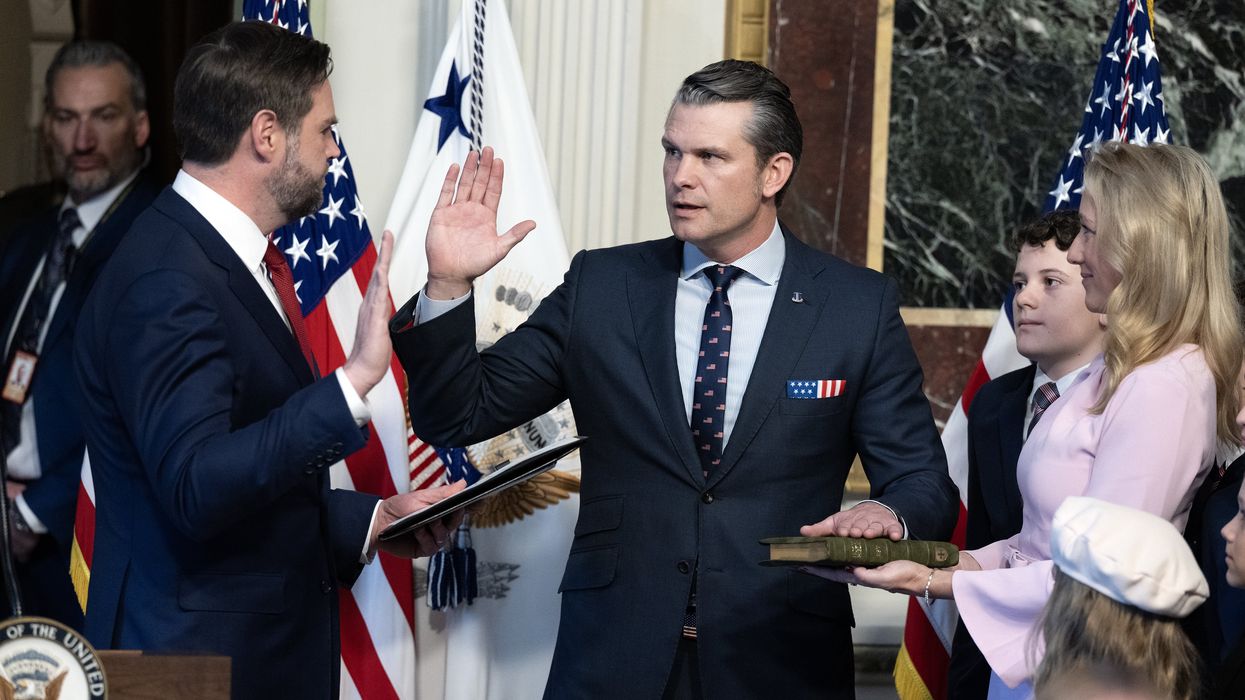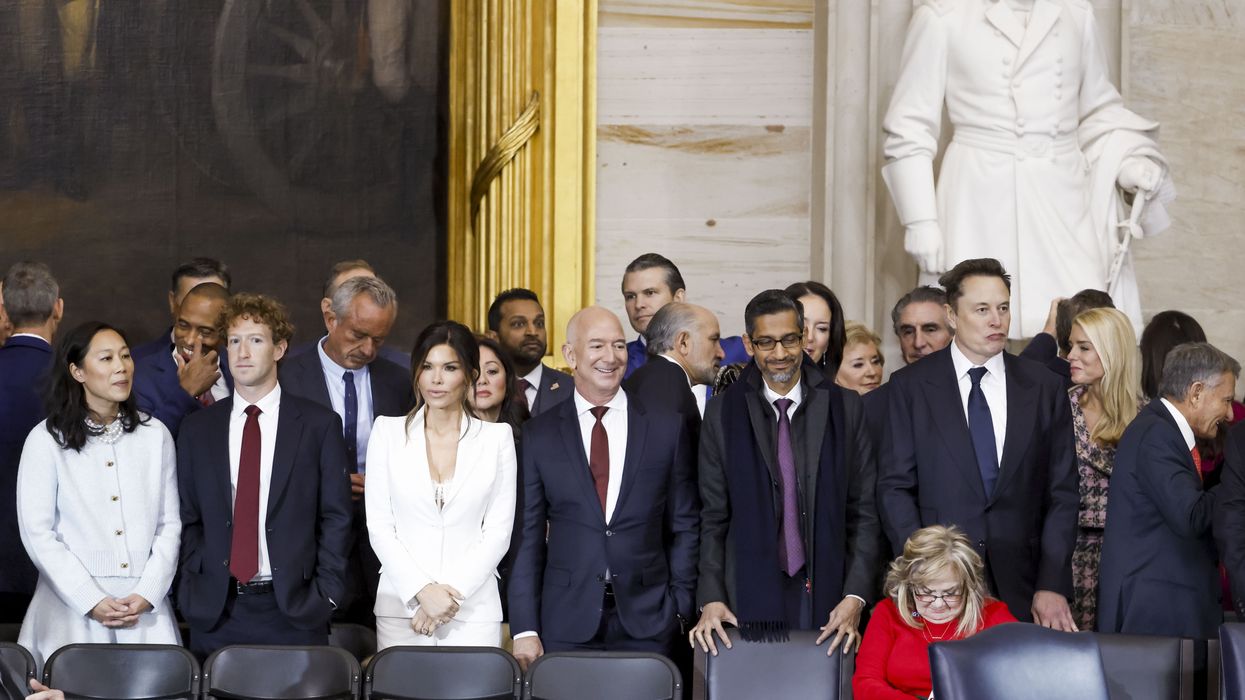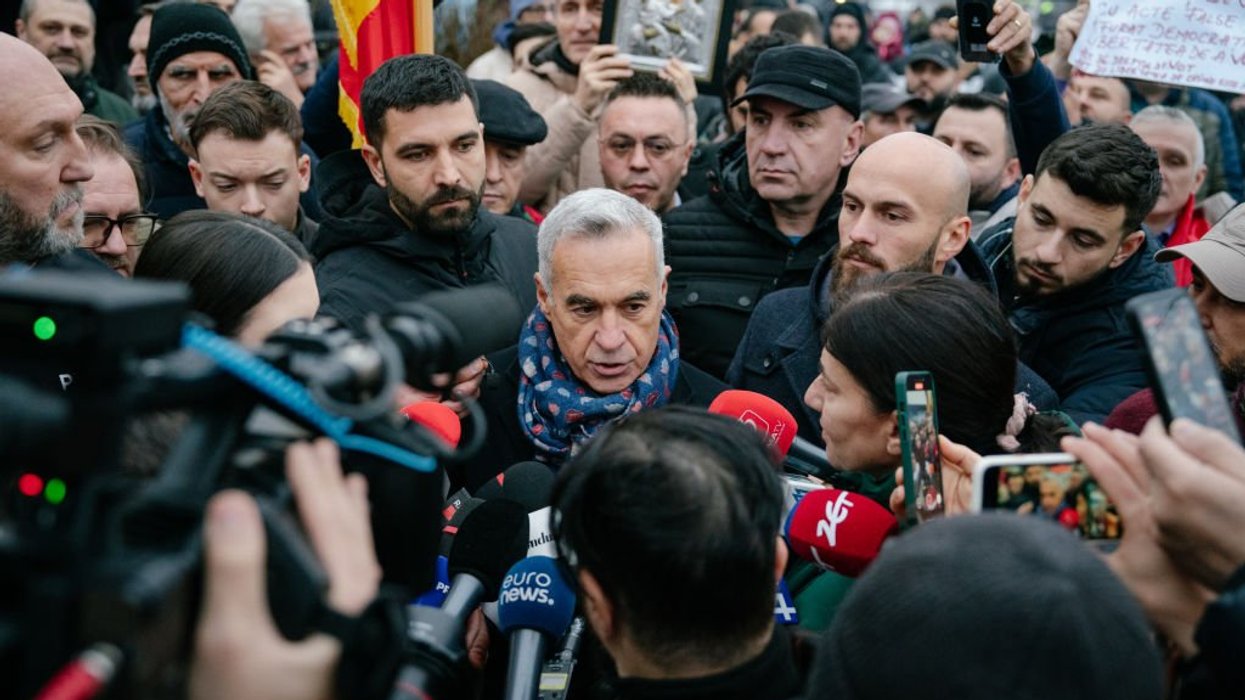John Schindler, formerly with the NSA and currently a national security columnist for the New York Observer, joined Buck Sexton on The Glenn Beck Program to talk about administrative posts currently under review by the Trump transition team. On the topic of national defense, Schindler had glowing comments to make about retired United States Marine Corps General James Mattis.
"Mattis is the real thing. We have a lot of general officers in the military who sort of pose as tough as nails but able to think big thoughts at the same time, and Mattis actually is that. I can vouch for that personally. And he has a fabulous reputation as our boss of Central Command, our Middle Eastern command. He legendarily commanded the first Marine division into Iraq, in 2003," Schindler said.
Gen. Mattis was unceremoniously fired by the Obama administration as the Central Command boss over the issue of Iran. According to Schindler, Gen. Mattis strenuously objected the Iran deal and felt empowering the mullahs in Tehran was a huge mistake. The general has never spoken publicly about the firing.
John Schindler is the author of Fall of the Double Eagle: The Battle for Galicia and the Demise of Austria-Hungary.
Listen to this segment from The Glenn Beck Program:
Below is a rush transcript of this segment, it might contain errors:
BUCK: Buck Sexton here in for Glenn Beck today on the Glenn Beck Program. Thank you so much for joining. 877-727-BECK, on those phone lines.
Got our friend John Schindler joining us now as our guest. He is the national security columnist for the New York Observer. You can read his latest at observer.com.
Also, you can follow him at Twitter @20committee.
Mr. Schindler, good to have you, sir.
JOHN: It is a pleasure as always, Buck.
BUCK: All right. So let's talk about it. This cabinet is coming together.
JOHN: Yeah.
BUCK: Some very -- certainly very interesting and dynamic picks.
Jim Mattis, General Mattis, he is possibly the next Secretary of Defense. You are formerly of the NSA. I'm formerly of the CIA. And we have Mike Flynn, perhaps as the next NSA. We'll talk about that in a second.
JOHN: Yeah.
BUCK: But let's talk about Mattis first. What do you think about this pick, assuming it goes through?
JOHN: Assuming it goes through, and Mr. Trump, our president-elect -- General Mattis -- has him on a short list for Secretary of State. If that goes through, this is the best news we could possibly get from a national security perspective.
Mattis is a -- notice, mad dog -- is a revered figure in national security circles. He's arguably the best general of his generation, a career marine.
I know Mattis slightly personally. And I think the world of him. I think he's a rare mix of a real warrior and a real scholar at the time. He's never married. He's made a little bit of jokes about being a monk. Not literally a monk. But he's devoted himself to his military profession his whole life. And he's a deep thinker. He's a genuinely deep thinker.
And DOD, Pentagon is a bureaucratic mess. It needs to be shaken hard and fixed particularly on the budgeting side and strategy side. And if Jim Mattis can't do it, no one -- no human being can't.
BUCK: He also is attributed with a quote so cool that I think anybody wishes that they had come up with it: Be polite. Be professional, but have a plan to kill everyone you meet.
JOHN: Right.
BUCK: That leaves -- yeah.
JOHN: That's Mattis. Mattis is the real thing. We have a lot of general officers in the military who sort of pose as tough as nails but able to think big thoughts at the same time -- and Mattis actually is that. I can vouch for that personally. And he has a fabulous reputation as our boss of Central Command, our Middle Eastern command. He legendarily commanded the first Marine division into Iraq, in 2003.
And also, he was fired, quite unceremoniously by the Obama administration a couple years back as the Central Command boss over the issue of Iran. And the really revealing thing about Jim Mattis, Jim Mattis has never spoken about this. He's a class act. He doesn't -- unlike Mike Flynn who makes up stories about why he was fired, Mattis was fired over principle. Mattis strenuously objected to the deal with Iran and felt that empowering the mullahs in Tehran was a huge mistake. And he got fired for that. He was fired very unceremoniously, rudely by the White House, and he's never out of the White House for that.
Him coming back to set some of this right would be a great thing for us and our allies.
BUCK: Now, John, you're a veteran. From friends of yours who are either still inside in the Armed Services or who have served, I've never heard from people I know in the Intel community, my side of things, anything but good things about Mattis. The support from inside the military, from the rank-and-file, all the way up to the top, my understanding is pretty strong. Pretty strong to very strong.
JOHN: Honestly, I can't believe I can say this: I don't know that I've ever heard somebody criticize Mattis in a serious way, on a really substantive issue. No -- no general officer makes all correct decisions, but he's a generally, you know, widely universally admired guy who knows how to make the trains run on time.
And as I said, the Pentagon needs someone who can break some China at this point. The budgeting process, the acquisition process, as evidenced by disasters like the F-35, the drone strike fighter, is really seriously broken. And we need someone who understands this, to go in, grab it with both hands, and effect some real change.
BUCK: All right. Now, before we get on to the issue of Flynn, of Mike Flynn as possible national security adviser, let's just -- Romney, meeting with Trump over the weekend. People are saying Secretary of State. Seems like a political move. But on the merits, what do you think of a Romney SecState?
JOHN: I think he would be great. I was never a big fan of Mitt Romney as a presidential candidate, but he has a lot of the skill set you need to be Secretary of State, someone who understands how the world actually works. As we know, to the embarrassment of President Obama, Mitt Romney's instincts on Russia in 2012 were exactly right, and the president was wrong.
I think a Romney appointment would be greeted in DC among professional bureaucrats as a really good thing, because he's a balanced guy. He's a smart guy. And he's not particularly ideological, and he will focus on getting American diplomacy back into earth's orbit and focused on reality. No more James Taylor concerts. No more John Kerry. No more Hillary pay-for-play. We know Romney, whatever his negatives are, he's not corrupt, and he understands how the world actually works. I think he would be a great Secretary of State.
BUCK: Yeah, very honest guy. Very capable guy.
JOHN: Absolutely.
BUCK: And also, I feel like with the Democrats, among their main criticisms of him from the election, including that he would give people cancer -- but we'll put that aside because that was just unfair and insane -- but that he was sort of a vulture capitalist. Maybe it would be a good thing for America to have a guy who understands how to use leverage and squeeze as much as possible.
JOHN: Oh, that's crazy talk. Stop it.
(chuckling)
BUCK: I think he would bring some pretty interesting things to the table, in that regard. He would do it with a smile and a firm handshake. But if you want somebody negotiating for your side in international trade deal, I think Mitt Romney would do a darn good job.
JOHN: Yeah. I don't think any of his negatives as presidential candidate remotely apply, you know, including that he causes cancer, right? Remotely have anything to do with how he would be Secretary of State. And I would welcome his appointment, as would a lot of people in DC, and not just the Republican Party.
BUCK: Speaking to John Schindler. He's the national security columnist for the New York Observer. Observer.com is where you'll find his pieces. I highly recommend you check him out. He's former NSA.
John, now let's talk about -- former NSA John Schindler, let's talk about the possible NSA Mike Flynn.
JOHN: Yeah.
BUCK: You do not hold back on this one. I want you to tell me and everybody else listening -- make the case, please, why is General Flynn, in your estimation, not the guy for this job?
JOHN: Well, let's leave aside his strange ties to Russia, the very pro-Kremlin things he says, that he's taken money from Russia Today, which is the state propaganda network. Let's leave that aside.
The problem is Mike Flynn is a smart guy who is -- doesn't play well with others. He rose to be a three-star general in the army. Was fired as director of the defense administration agency by Obama.
And as a strong critic of Obama and foreign policy, let me say that Obama was absolutely right to fire Mike Flynn as the director of DIA. Mike Flynn wanted to reform DIA, which is all well and good. It's a really stodgy intelligence community bureaucracy. But he did it in a way that was, frankly, you know, abusive of the workforce, and he was quickly hated by the workforce. And you don't change an administration by making everyone hate you.
As a Democrat just found out, you know, in the election, the white working class is not going to vote for you if you hate them. By the same token, the DIA workforce is not going to help you reform, if you make clear they're all fools and idiots and lazy.
Mike Flynn turfed out. And my fear is he will bring that same management style, which is aggressive, where it doesn't need to be, into the National Security Council.
BUCK: Now, let me ask you -- to be fair to the other side of this, which I don't pretend to be on. But I'm assuming that if we had a Trump spokesperson or somebody attached to the transition team here, they would say -- or they could say -- and I wanted to pose this to you, John, but he's going to be in an adviser role to the president, so it's really more about his knowledge, background, and understanding of issues, like dealing with jihadism. Radical Islamic terrorism. And not -- all the things you talked about may well be true. And I've heard similar things.
And my understanding is that bureaucratically there was an ineptitude on display at the top of DIA, in terms of how he handled that.
JOHN: Oh, yeah.
BUCK: Which is also a very difficult job, to manage these enormous Intel bureaucracies.
JOHN: Oh, yeah.
BUCK: But that wouldn't be his role. His role would be to be there, close to Donald Trump, and advising him, as national security adviser. What about on that side of things? When it comes to his judgment, knowledge, and understanding of the threats we face?
JOHN: I think the problem you have there is Trump is a very impulsive, high-strung individual. You want a national security adviser who can moderate that. And Flynn is exactly the same kind of shoot-from-the-hip, say hard things without thinking about them. And when you're in that job, that's going to have real consequences.
And you want someone there who can think big picture about strategy. And Mike Flynn is right about some of the things he says about jihadism. But he also thinks it's the biggest threat we face. And I don't.
I think it's top three. But the reality is -- you know, Russia and China both have several thousand nuclear weapons that can wipe us off the face of the planet. The jihadists, thank God, don't.
And that means, they're a huge threat to our national security. I disagree with Mike Flynn that this is the preeminent threat we face. We face a lot of threats. And jihadism terrorism is one of them.
He also has a way of alienating the entire Muslim world, which given that we're utterly dependent on Muslim allies to fight jihadism, that's not really a good thing.
BUCK: What do you make of this report, by the way, switching gears to the Obama administration for a second -- everyone is talking so much about the Trump transition that I feel like it gets lost sometimes that there's still a White House that's making decisions, they're trying to bolster the Iran deal, as we speak. So they're saying not to make it harder to unravel for Trump. But it seems like, to hit the accelerator at the very end here on that.
JOHN: Of course. Of course.
BUCK: Yeah, had some consequences.
JOHN: They want to make this irreversible, down to the last minute they're in the White House. And, you know -- because this is their signature thing, right? This is Obama's claim to fame. He got this great deal with Iran, which is not really a great deal. And Trump wants to tear it down. I think actually tearing it down will be harder than Trump and his people realize.
But the Iranians are going to have a much harder -- harder team in Washington now than they've had, where Obama and company have accommodated everything they've wanted and let them get away with crazy stuff.
Back to Jim Mattis. Jim Mattis raised holy hell with the White House several years ago when the Iranian Intelligence Service tried to blow up the Saudi ambassador in the United States in a public restaurant in downtown Washington, DC. This was an unambiguous act of war, and Mattis wanted us to seriously diplomatically retaliate.
You know what the White House did? Hardly anything.
And they told Mattis to calm down. Mattis was right. And this kind of appeasement of the mullahs in Tehran has gotten us worse and worse Iranian behavior. And if that stops, I'll be very pleased.
BUCK: There's also this report that -- that Clapper and Carter have told Obama to fire the head of your former base, the NSA.
JOHN: Yeah.
BUCK: What do you think about that? What's that all coming from?
JOHN: It pains me to say -- I think that would be a wise move. And it is, in fact, overdue. Admiral Mike Rogers, a Navy four-star admiral, you know, came to the NSA with a great reputation. Unfortunately, he's sullied that reputation through some pretty bad mistakes.
He's run through a reorganization in a way that really upset the workforce with cause. He's been distant. He hasn't communicated well with the workforce. He's upset some of our close intelligence allies around the world. And most importantly, we've had more security disasters.
He was brought up to clear up the epic mess left behind by the Snowden theft and defection to Russia. And now he's had another case, another -- the Martin case, very similar to -- in the sense that the NSA affiliate, a contractor who stole huge amounts of classified data and brought it home with them -- this has happened again.
NSA security and counterintelligence have not been reformed as I and others have urged for years, as Congress was told was happening. It has not happened. And Mike Rogers is the captain of the ship here, and he has to go down. Unfortunately, I think relieving him of duty is the only choice the Pentagon and the intelligence community has.
BUCK: Right before you go, John, how would you -- if you had to give a grade to Trump's national security picks and considerations because I know there's a lot that's still up in the air, where would you -- what would you grade it right now?
JOHN: Well, if we're going with Mattis, I'd say it's an A-plus. You know, Flynn -- Flynn brings that down a fair amount. But, honestly, I'm encouraged so far. We don't know a lot so far. It's mostly rumor.
But I think we're going to have -- it's going to break out two ways: A lot of the cabinet appointees and senior appointees in the departments like State, Defense, other, you know, Homeland Security, are going to be really solid people who know what they're doing and are not particularly ideological. They're not Trumpers. They're Republicans, but they were not part of the Trump movement.
The folks inside the White House are going to be clearly Trump loyalists, who perhaps their loyalty matters to the president-elect than their knowledge of, say, national security affairs. That means, you're going to, from day one, have some tension from professionals, you know, career generals, diplomats, whatever, successful business people, who are running cabinet appointments and the folks in the White House who maybe don't understand how all that wonderful stew gets made over there across the river in northern Virginia. So I think there could be some tension right out of the starting date.
BUCK: All right. John Schindler is the author of Fall of the Double Eagle. He is also the columnist at the New York Observer for national security. Go to observer.com. John, great to have you, sir. Talk to you soon.
JOHN: Great to be here.
BUCK: 877-727-BECK. Buck in for Glenn. We'll be right back.
Featured Image: (L to R) President-elect Donald Trump welcomes retired United States Marine Corps general James Mattis as they pose for a photo before their meeting at Trump International Golf Club, November 19, 2016 in Bedminster Township, New Jersey. Trump and his transition team are in the process of filling cabinet and other high level positions for the new administration. (Photo by Drew Angerer/Getty Images)











